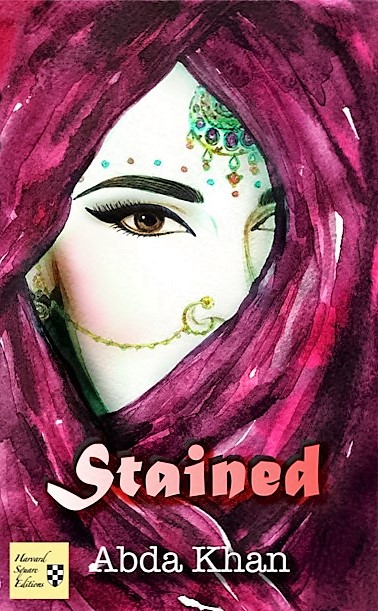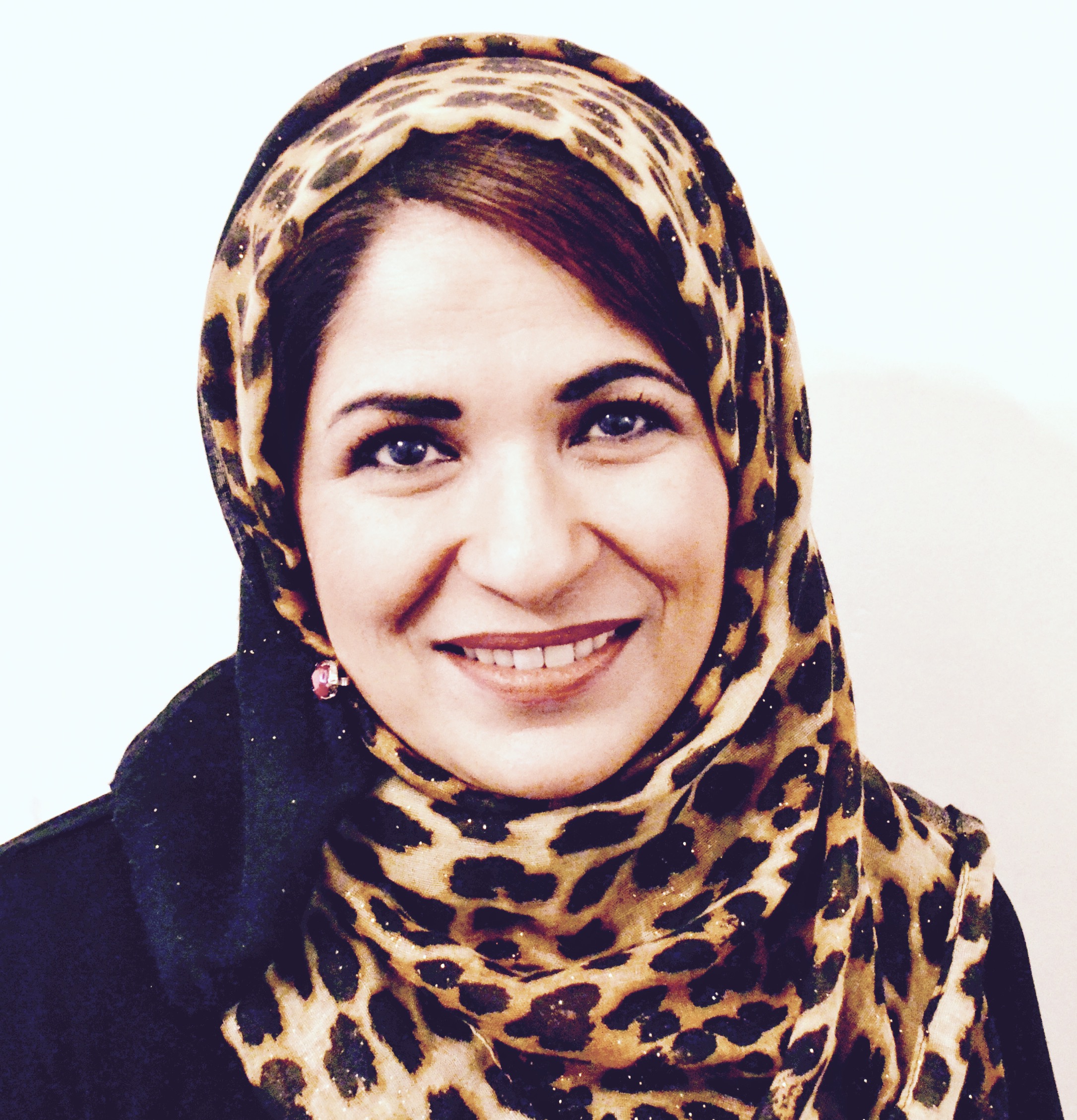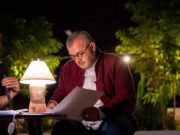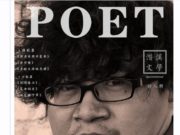Abda Khan was born in England, in 1969. She was the seventh of eight children to Pakistani immigrant parents, and the first of their children to be born in the UK.
Abda is a lawyer by profession, but decided to start writing a few years ago,
Her first novel, Stained, was published in October 2016 in the USA by Harvard Square Editions, and is available worldwide on Amazon. It has been described by Booklist, USA, as the “contemporary Tess of the d’Urbervilles”.
The story is about 18-year-old British Pakistani girl who is raped, and the lengths that she then goes to in order to preserve the family honour; this leads her down a dark and dangerous path from which there may be no return.
The book tackles a number of taboo subjects, including rape and ‘honour’ issues, faced by women in South Asian and Muslim communities. Abda was inspired to write the novel as a result of her experiences of working within these communities as a Solicitor for the past 25 years, and due to the lack of fiction depicting such characters and themes.
Abda has as a result been shortlisted for the Nat West Women of Achievement Awards 2017 in the Arts and Culture category.
Abda’s latest novel is entitled Razia, and once again Abda fearlessly confronts subjects that are rarely seen in contemporary fiction.
In this novel, Farah is a 30-year-old British-Pakistani lawyer working in London. A chance encounter at a work dinner plunges Farah into moral quicksand when Farah comes across Razia, and becomes convinced that she is being kept as a slave, and decides to help her. The novel follows Farah’s journey from the law courts of London to the brick kilns of Lahore, as she comes to understand the tangled roots of Razia’s predicament. She encounters generations-old arrangements based on bonded labour, family debt, feudal systems and “honour”-based violence, and finds corruption everywhere she turns for help. And when the authorities step in to return Razia to Pakistan, their actions have tragic results. As well as modern day slavery, the novel looks at cultural conflicts, identity, and its heart it is a love story.
To watch a video about Razia, and to be involved in the crowdfunding process to help publish this book, please visit Unbound.
Abda also writes short stories, and guest writes for various publications.
Aside from her legal work and her writing, Abda undertakes voluntary work; with the charity Mosaic, mentoring secondary school children, and with Birmingham & Solihull Women’s Aid, helping victims of domestic violence, rape and sexual assault.
You can find our more about Abda at www.abdakhan.com
An excerpt from
Razia
Farah left the guys chatting away, went into the hallway and carefully opened the door, just as she had been directed. She searched for a light switch, which she located by way of a wall switch to her left, but she soon realised that this wasn’t the washroom at all. Rather, she had walked into some sort of a large pantry or perhaps a utility room. It was a decent sized room, and was well fitted with wooden cupboards and worktops which most people would be proud to have in their actual kitchen, and all around her were boxed and unboxed dinner sets, pots, pans and various kitchen gadgets. She was about to turn back when she heard shouting, and muffled crying. There was another door on the other side of the utility room. The noise definitely seemed to be coming from over there, from the other side of that door. Farah walked over and stood by the door, and could just about make out the conversation, if one could call it that. It was a strange mix of English, Urdu and Punjabi.
Farah pressed her ear against the door to listen.
‘Haram zaadi, how dare you ruin the food, can’t you do anything right, you little bitch!’
Farah couldn’t believe it! She was astonished, for she was certain that it was Zaheer that was yelling. She would never have believed that he could talk to his wife in this way, if she hadn’t heard it with her own ears.
She gently pulled the handle to open the door ever so slightly, mindful not to make any sound, and through the tiny gap she could now just about see into the kitchen; it was a large, well proportioned, show room type kitchen, with glossy, oyster-coloured, fitted units, black granite worktops, and state of the art fitted appliances. Zaheer had his back to Farah, and his wife was stood next to him, also with her back to her. And they were both looking down. Farah carefully opened the door a tiny bit more, and what was previously a sense of surprise instantly turned into a sensation of shock that flooded through her entire body, like a terrifying riptide. For there, in the far corner, sat next to the range cooker, visible between the gap between Zaheer and Aneela, cowering on the stone tiled floor, was a young woman. She was dressed in traditional salwar kameez, both of which were a stained, dirty brown colour, and pretty much creased from top to bottom. Her mismatched scruffy looking black chaddar was draped around her head, shoulders and chest, and she was wearing tatty plastic green sandals. Her hair was scraped back off her face, and mostly hidden under the chaddar. Her face was a slightly dark brown in tone, and plain, lacking any make-up; it was graced only with the tears running down her cheeks.
‘Please sahib!’ she mumbled, in a tiny voice, in a dialect of Punjabi. She seemed to be begging, with both her hands put together in front of her, like a prayer pose. ‘Everything else is fine; it’s just the murgh mussalam, I’m not sure what happened, but I think I became confused with the timer, and must have set it wrong. Please, forgive me master!’
She sobbed quietly, but her brown eyes were painfully strained; they looked like they were brimming with terror and fear. The scene unfolding before Farah seemed to be happening in some sort of cruel slow motion. The girl reminded her of a cornered, scared, helpless animal who is uncertain of its fate. The girl’s eyes darted desperately from Zaheer to Aneela and back, in an agonising search for any visible signs from either of them for some sort of a reprieve. She looked and sounded desperate, and petrified.
‘Kameeni, how many times have I shown you how to set the timer properly, you can’t get such a simple task right!’ shrieked Aneela, joining in with the tirade against the poor girl. She couldn’t have been more than sixteen or perhaps seventeen years old. The clearly visible agony on the girl’s face worsened.
Zaheer raised his hand and started to bend over to hit her. The girl immediately moved her hands and spread them over her head. She hid her head in her lap, as if she was certain of, and feared the inevitable. At the same time, she tried to deaden her shrieks, fearful of screaming out aloud. But she was spared, as before Zaheer could make contact, his wife yanked him back.
‘Not now, Zaheer,’ she urged him, and Zaheer stood back up. ‘We have guests. This is not the time. Leave her be. The kuthi will keep. You can sort her out later.’
Zaheer let out an exasperated grunt.
‘She’s just like the rest of them. They are always bloody good for nothing,’ shouted Zaheer. ‘Once a slave, always a slave!’
Farah stepped away from the door, and moved into the corner of the small room, to the side of the door. She placed one hand firmly over her frantically beating chest, and the other over her mouth which had fallen wide open in horror. She closed her eyes, and she took slow breaths in and out. For the first time in her life, she thought she was experiencing something akin to a panic attack. She concentrated hard to try and calm her uneven breath, and stop her hands from shaking. Oh my God, she heard herself whisper. Slave, she repeated in her mind. She had heard enough. She headed back to the door from which she had entered, and stepped out into the hallway. She tried the door next to it, and found this was in fact the bathroom, and she went in. She had to take a few minutes to calm herself down, and gather her rapidly moving thoughts into some semblance of sense.
When Farah re-entered the dining room, Zaheer was already back in his seat at the head of the table. He was laughing and joking, making small talk just as a dinner host would be expected to do, as though absolutely nothing had happened. He had just scared a young girl half to death, almost physically assaulted her, shouted abuse at her, called her a slave, and yet here he was; the life and soul of the party. He was thoroughly incandescent and carefree. How did he do it? Farah asked herself. How could he switch from evil and sinister to happy chappy so quickly?




















